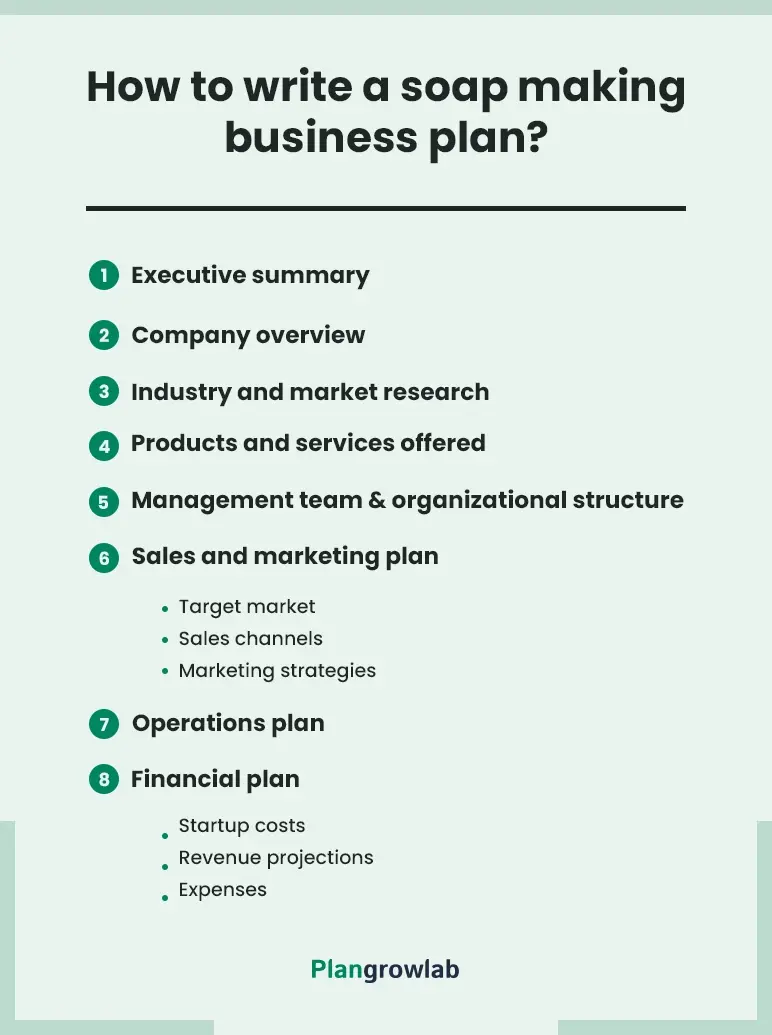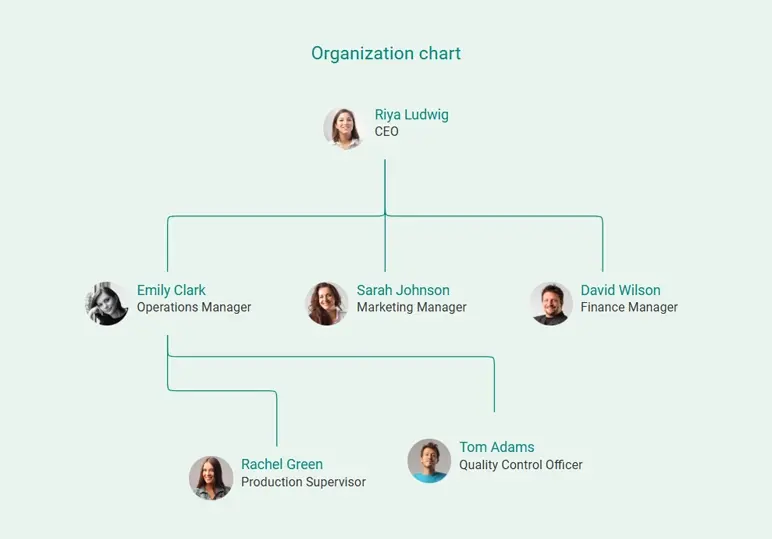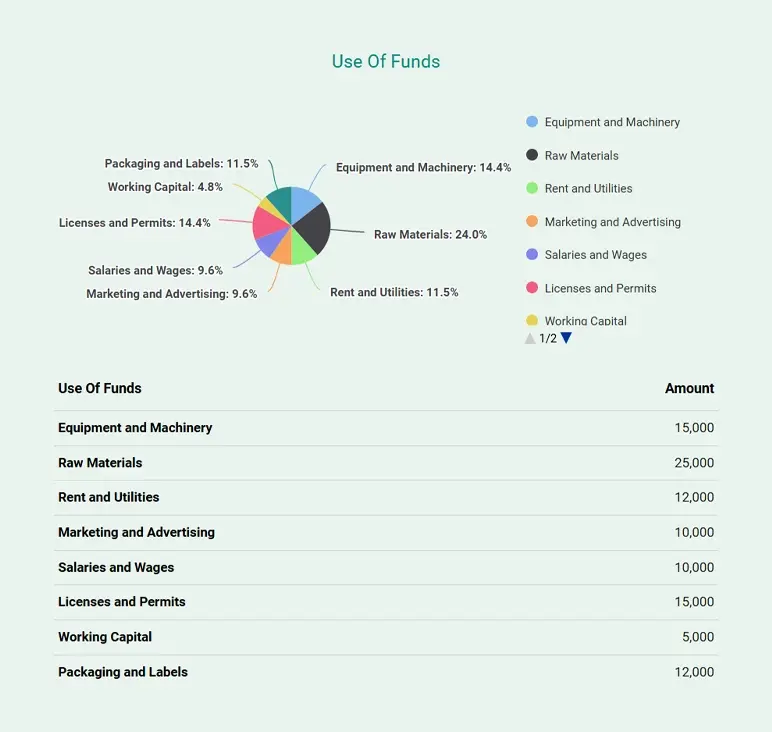Starting a soap-making business can be exciting, but figuring out the first step—writing a solid business plan, can feel like a puzzle.
That’s exactly how Joanna Couch, the founder & CEO at “The Soap Gal” felt when she began her journey.
In fact, we recently talked about how she structured her plan, what challenges she faced, and how she tackled them to turn her idea into a profitable soap-making business.
From our conversation, I’ve prepared this guide to help you write a clear, practical shop making business plan that will set the foundation for your success.
What is a soap-making business plan?
A soap-making business plan is the first requirement to be met before beginning your business. It’s a detailed guide in which all the key elements of the business have been covered—the target market, products and services, pricing strategies, marketing, or financial strategies.
It also defines your mission statement, outlines the types of soaps you’ll make, identifies your customers, and explains how you’ll sell your products
More importantly, it helps to attract investors or secure loans by proving that your business idea is both profitable and sustainable.
Why is a business plan essential for a soap-making business?
A business plan isn’t just a bunch of ideas thrown together—it’s a clear, organized guide that helps you at every stage of your business. Here's why it matters so much:
- Defines your goals: It lays out both short and long-term goals, helping you figure out what you're selling, who you're selling to, and how you'll grow.
- Controls your money: Every business runs on money. A good plan should cover start-up costs, pricing, profits, and expenses to keep track of every dollar spent.
- Plans your marketing: It explains what marketing strategies you’ll implement, what channels you’ll pursue, and how you'll attract and retain customers.
- Prepares for challenges: Running a business carries risks. Having a plan helps you spot problems in advance, and then the solutions you come up with won't slow you down.
- Opens doors to funding: You can easily attract a loan or investor. Your plan proves your soap-making business is worth this investment.
A good business plan is not only a tool to keep your soap-making business on track, organized, and focused, but the foundation for making it successful as well.
How to write a soap making business plan?
Writing a business plan for your soap-making business might sound like a major task, but trust me it's worth it. Here's how you break it down step-by-step:

1. Executive summary
An executive summary is like the intro to your business plan. It’s short but will capture people's attention.
In this section, first talk about what your soap production company is all about—what kind of soaps you’ll sell, who your customers are, and what makes your soaps different.
In addition, give a brief overview of your marketing plan, how your company distributes its products, and how much money you anticipate earning.
By the end of this section, readers should have a clear snapshot of your business goals and why your soap-making venture is positioned for success.
“When I was writing the executive summary the toughest part was keeping it short but still covering my mission, target market, and goals.
I started by writing down everything I wanted to say, even if it felt like too much. Then, I went back and simplified it, focusing on the most important details and what makes my business stand out.
After a few drafts, I had a clear, focused summary that not only explained my business but also gave me the confidence to move forward.”—Joanna Couch
2. Company overview
This is where you tell your story. Share your business name, location, and legal structure—whether you’re a sole proprietor, partnership, or LLC.
Provide a brief background on how your business started, what inspired the idea, and the journey that led to its creation. Highlight any key milestones, awards, or recognitions you’ve achieved so far.
After that, talk about your mission—what are the core values of your soap making company—and your vision for where you want it to go.
Outline your short-term and long-term goals, such as launching new product lines, expanding into new markets, or building a loyal customer base.
“Challenging part when writing a business overview was clearly explaining what my business does and what makes it unique without rambling.
I focused on eco-friendly ingredients, plastic-free packaging, and custom gift sets to stand out. Breaking it into sections—mission, products, and values—kept it organized and professional."—Joanna Couch
3. Industry and market research
Before starting a new business, you need to know the market you’re getting into, and this market analysis section shows you’ve done your homework.
You can start by talking about the soap industry trends in the soap-making industry—like the demand for organic soaps, sustainable products, and zero-waste companies that focus on reducing environmental impact.
Highlight how these trends create opportunities for your soap business to meet consumer preferences for eco-friendly and handmade products.
Look at the competition (including the popular soap making businesses) and see what they’re doing right, and where they’re maybe missing the mark.
“While conducting soap production industry analysis, finding reliable data without spending a lot was a challenge.
I solved it by researching online reports, checking competitor websites, and visiting local markets to see what was selling. Breaking it into market trends, target audiences, and competitors made it easier to organize."—Joanna Couch
4. Products and services offered
Let's talk about the soap product line and what you're selling. Be specific—are you offering herbal, scented, glycerin soap, liquid soap, or customized soaps?
Maybe you do gift sets, skincare packages, or even novelty soap for an event.
Furthermore, you can mention extras like bar soap-making workshops, subscription boxes, or how your business makes custom bars based on existing customers' preferences and special occasions.
Also, highlight what makes your products stand out—whether it's natural ingredients, cruelty-free practices, or eco-friendly packaging.
“In the products and services section, I had to highlight what made my soaps unique without listing too many details.
I grouped products into categories—moisturizing bars, exfoliating soaps, and gift sets—and focused on features like natural ingredients and eco-friendly packaging.”—Joanna Couch
5. Management team and organizational structure
Who’s running the show? Start by introducing yourself as the owner and explaining how you’ll handle production, marketing, and sales if you’re running the business solo.
Highlight your skills, expertise, and any relevant experience that makes you well-equipped to manage operations effectively.
Additionally, you may shed light on the core management team members, like the general manager, production manager, marketing executive, sales representative, as well as fulfilment coordinator.
If applicable, develop a clear organization chart that shows the hierarchical structure of your soap making company and how key roles are interconnected.

"Writing the company’s management team and organizational structure section was tricky because, as a small business owner, I was handling most roles myself.
The challenge was showing investors I had a plan to fill skill gaps. I solved this by outlining my strengths and listing roles I’d outsource—like bookkeeping and marketing."—Joanna Couch
6. Sales and marketing plan
In this section, explain your approach to selling and promoting your soaps. Focus on providing a clear strategy for reaching your target audience and growing your customer base.
Here’s a list of a few key elements that you should include in this section:
- Target market – Start by identifying your ideal customers. Describe who they’re, what they value, and why they would choose your products.
- Sales channels – Outline where you plan to sell your products. Mention whether you’ll focus on online sales, local markets, craft fairs, or partnerships with retail stores.
- Marketing strategies – Describe the marketing methods you’ll use to attract and retain customers. Provide an overview of tools like social media, ads, influencer collaborations, email campaigns, and publications in soap industry magazines to build credibility and attract attention.
- Promotions – Include ideas for promotions and customer incentives, such as discounts, giveaways, and referral programs, to drive sales and encourage repeat purchases.
A successful sales and marketing plan can lead you to the right kind of audience and loyal customers as well as set up your soap business as a trusted and recognized brand.
"Writing the sales and marketing plan was challenging at first because I had too many ideas and needed focus.
I started with affordable strategies—social media, local markets, and word-of-mouth. I also added promotions like giveaways and seasonal discounts to attract target customers.
Breaking it into steps—local launch, online store, and partnerships—helped keep it clear and realistic."—Joanna Couch
7. Operations plan
The operations plan describes how the soap making business will operate daily. It incorporates production, acquiring raw materials, maintaining quality, keeping inventory, and shipping.
Start from the process of producing from ingredient sourcing through mixing, molding, curing, cutting, and packaging. Mark out special techniques and tools applied such as molds, mixers, and labeling machines.
Discuss where you’ll source materials like oils, fragrances, and eco-friendly packaging. Include plans for maintaining supplier relationships and ensuring quality standards.
Describe how you’ll manage inventory and storage to keep materials and finished products organized. Finally, outline your shipping process, whether you’ll handle deliveries yourself or use third-party providers.
"Figuring out all the details like how to manage production, packaging, and delivery without missing a step was a bit challenging for me at first.
So, I started creating step-by-step workflows for everything, from sourcing ingredients and mixing batches to curing, cutting, and labeling the soaps.
To help me stay on track, I created spreadsheets to track the levels of our inventory, our raw materials, and when it's time to reorder before running out”—Joanna Couch
8. Financial plan
A financial plan outlines how your soap-making business will generate revenue, manage costs, and achieve profitability.
It acts as a roadmap for tracking expenses, planning sales targets, and managing growth, while giving investors confidence in your business’s financial viability.
Here’s what to cover in your soap making financial plan:
- Startup costs: List expenses for equipment, ingredients, packaging, licenses, marketing, and inventory.
- Revenue projections: Estimate sales and earnings for the first 3–5 years, broken down monthly or quarterly.
- Expenses: Detail recurring costs like materials, rent, utilities, marketing, and salaries.
- Financial statements: Include profit and loss, cash flow projections, and a balance sheet.
- Funding needs: Specify how much funding is needed, its purpose, and its growth impact.

Moreover, address potential financial risks and develop a risk management plan that helps you demonstrate you’re well-prepared for upcoming challenges.
“In the financial plan I had to figure out startup costs, pricing strategy, cash flow statements, and sales forecasts without knowing exactly how things would play out.
It was tough for me to estimate expenses and profits realistically. I solved this by researching ingredient costs, packaging, and marketing budgets, and then using templates to organize my numbers.”—Joanna Couch
Download the soap-making business plan template
Ready to start your business and need a structured format to put your plan together? Fear not! Download our free soap-making business plan template in PDF format and get started.
Many soap business entrepreneurs have successfully launched their businesses using this professionally designed template. With real-life examples and actionable insights, it will help you create a well-detailed and investor-ready plan.
Download it now and customize it according to your requirements.
Conclusion
With this guide and the soap-making business plan template, you’re now well-prepared to create a clear and detailed plan for your business.
A good business plan organizes you and increases your possibility of attracting angel investors to come and fund your venture.
But in case you get stuck, or you need expert advice, don't hesitate to contact our professional business plan consultants. They’ll help you refine your plan and make it investment-ready.
So, wait no longer; get a quote and take the first step today!
Frequently Asked Questions
What do investors look for in a soap business plan?
Investors would prefer seeing a clear business idea, achievable financial projections, and a successful marketing strategy. They also look for scalability and proof that your products meet market demand.
How to get funding for your soap-making business?
You must first create a comprehensive soap-making business plan with all the necessary details, such as goals, strategies to reach them, and financial projections for the next 3-5 years. Then you can apply for small business loans, seek investors, or even go for crowdfunding campaigns.
Where to find business plan writers for your soap-making businesses?
You can hire professional business plan writers through some platforms like: Upmetrics, Fiverr, Upwork, local small business development centers
How much does it cost to write a soap business plan?
A business plan can be free if you create it yourself. Business plan software might cost $7–$50 or more per month, while the cost of hiring professional writers ranges from $1,500 to $25,000.

